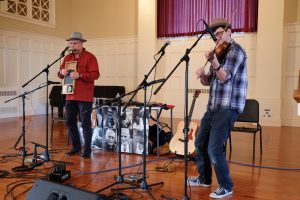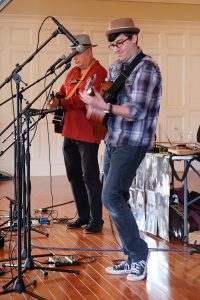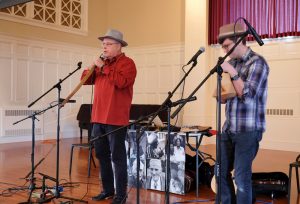
Musician and music historian David Holt inspired a chapelful of Williston students to try hamboning. The traditional African percussive art, brought to the American South by enslaved people, consists of rhythmically slapping parts of the body: legs, arms, chest, different parts of the hand, and, as seen in the two-second video clip that downloads when you click here, cheeks. “This is what people used to do before they had cable,” Holt quipped.
In a wide-brimmed hat and tap shoes, Holt performed songs on an array instruments with his musical partner, Josh Goforth. A four-time Grammy winner, Holt is the host of the PBS television show “David Holt’s State of Music.” Their visit was part of the Grum Project, a visiting artist program funded by a generous alumna.

The duo played songs that were antecedents to the blues, songs with roots in Europe and Africa. Each song was accompanied by a story, usually a funny one, of a person associated with the song. Projected above Holt would be the black-and-white portrait he took of that person. Most of them resided in small mountain towns in western North Carolina.
The image of Mary Thompson, who lived to be 120, was on the screen when Holt performed “Greasy Greens,” her favorite song. When he talked to Thompson, he asked her how the song went. She said she couldn’t remember the tune. He asked her to tell him the lyrics. She said she couldn’t remember them either. “I haven’t heard the song in 105 years,” she answered. He also asked her to tell him how she lived so long. She chided, “By minding my own business.”
Susie Brown lived to 122. She taught Holt to play the washboard. Playing involves putting sewing thimbles on one’s fingers and tapping lightly, not scraping. During his performance, Holt pulled out his washboard, “a Stradivarius,” he said jokingly, that had a built-in wood block below and tin cup beside it to make a variety of sounds. “This is the home entertainment center for the 1800s,” he said. Goforth accompanied him on the fiddle with Brown’s smiling, wrinkled face above.

On stage, Holt and Goforth made sounds from many traditional instruments: a mouth bow, the bones (literally bones from a cow, they had been passed down from Holt’s great-grandfather, a cowboy and later Attorney General in Texas, Holt said), the spoons, the paper bag, a slide guitar (a steel pipe or the neck from a bottle of wine—”a nice Merlot works really well,” Holt said), and an expertly crafted wooden banjo made in the 1880s at a time when the metal components would have been too expensive for its makers. Instruments were not easily accessible in the late 1800s and early 1900s, Holt said, especially in the communities in which this music was percolating. Music makers improvised, with astonishingly beautiful and soulful results.
As the image of an elderly Doc Watson shone on the screen, Goforth sang and played his song “I’m Sitting on Top of the World.” Holt toured with the seven-time Grammy winner and revered guitarist from 1998 until Watson’s death in 2012. Goforth invited students to check out Watson on, as his grandmother calls it, “the YouTubes.” Goforth, who has played alongside Holt for 16 years, grew up in Tennessee and has been playing music since he was 4 years old.
Throughout the performance, Williston students sang along when asked, clapped to the beat, gave hamboning a try, and when the program was over, stood for an enthusiastic standing ovation. Holt and Goforth remained on campus to answer questions during lunch in the Dodge Room.


Hi,
Very excited to see that David Holt was at Williston.
I am a huge fan of old time music both as a player and avid listener.
John Whitman
Parent